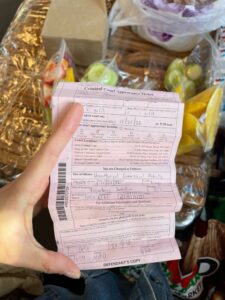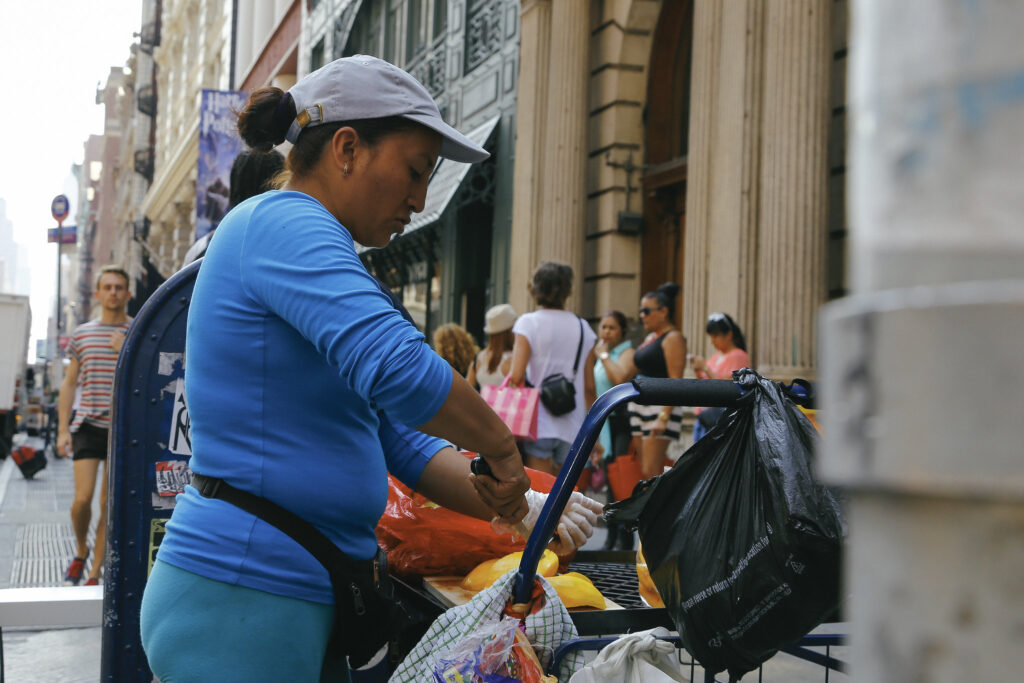(NEW YORK) — A New York City Police Department officer slapped handcuffs around Maria Falcon’s wrists on April 29, 2022. A fruit vendor from Ecuador, Falcon was arrested for selling mangoes without a proper license on the platform at Broadway Junction station. Her daughter recorded the incident and received support but also sparked outrage among the population. In the video, Falcon is led away by a police officer almost twice her height while another officer follows, pushing her confiscated vending cart and supplies.
“Oh, my god,” her daughter can be heard saying behind the camera as she trailed behind her mother with the police.
Falcon isn’t the only fruit vendor arrested in New York City in recent times. Since Mayor Eric Adams, a former NYPD captain, assumed office in 2022 and shifted power over illegal vending from the Department of Consumer and Worker Protection (DCWP) to the Sanitation Department, his administration has cracked down on unlicensed food vendors. According to data published by CityLimits in March, the city issued 5,197 tickets to illegal vendors in 2022 — a striking 53 percent increase over 2019. Vendors, most of whom are immigrants, face an increasingly hostile city hall while they try to eke out a living by selling food on subways and sidewalks.
Many have criticized Adam’s heavy-handed policing strategies. Critics, ranging from the general public voicing their opinions on Twitter to organizations like the Street Vendor Project, believe that in a city with a surging violent crime rate, unlicensed fruit vendors should be the lowest priority. Falcon lamented the multiple times police have harassed her, arrested her, and confiscated her cart.
“They have taken everything from me,” Falcon said during an interview for The Click while standing on the subway platform at Broadway Junction. “We have to stay on guard all the time.”
Street vendors are essential to New York City and have a long, storied history. From oyster shuckers selling fresh shellfish on the streets in the 1600s to the modern-day halal cart, New York’s sidewalk vendors are often of immigrant backgrounds. They faced opposition from city officials who claimed their carts to be unsanitary and unsafe. In the 1980s, lawmakers strictly capped the number of vending permits, a policy that remains in place today. Only 853 non-veteran street permits are legally allowed in a city with between 10,000 and 20,000 street vendors. There have been attempts to modernize the system, but getting a permit is nearly impossible for most vendors. According to the Street Vendor Project, the waitlist has been closed for over 10 years.
Another street vendor, MaryAle, who would not give her last name for fear of arrest and deportation, told The Click that the police have targeted her many times, throwing away her belongings and forcing her to start fresh.
An immigrant from Ecuador, MaryAle came to the US nearly 18 years ago. Her brother came to the States first and started selling fruit on the subway, later introducing her to the job. For nearly fifteen years now, MaryAle has been selling mangoes on the streets of Brooklyn. She travels to the Bronx once a week to get her mangoes. The 2-hour-long trip is worth it for her profit margins since she gets a good price by buying in bulk, she told The Click.
MaryAle works up to 14 hours and makes around $80 to $100 on an average day. In the colder months, though, business is slower, and the cost of fruit goes up. But she works to support her two teenage daughters back in Ecuador, whom she hasn’t seen since they were babies and only speaks with over the phone. When asked if what she makes is enough to support them, she shrugged, “More or less.”
Lately, though, she said, a sense of anxiety has risen among all fruit and street vendors thanks to a wave of ticketing and arrests.
According to MaryAle, the police officers target her specifically, searching the subway stop where she sells mangoes. She’s been arrested many times; once, she was detained at a local precinct for several hours. “Police keep kicking us out,” she said.
While it is illegal to sell food on the subway, MaryAle said she does have a sidewalk vending permit, which she got for $200 on Broadway and 42nd St. The permit states that one must vend at least 15 steps away from a subway station.
At Broadway Junction, several high-profile arrests of sellers have sparked media attention. Falcon, who was arrested several times before the footage of her last year’s arrest went viral, described her interaction with police as a game of cat and mouse. She said that she has learned over time which police officers are the “good” ones, the ones who won’t issue tickets, and which ones to watch out for. She said that Hispanic policemen tend to be harsher than others. The “good” policemen, she said, usually only give her a warning, telling her to pack up shop before four o’clock when the “boss” does his rounds.
But Falcon said she was ticketed frequently in 2022, pulling a ticket out of her pocket as proof. She would receive three to four tickets a week. These tickets require court appearances that take up to a full day, which, according to Falcon, is not only inconvenient but also bad for business.

Falcon has received three to four tickets a week in 2022 alone. [credit: Celeste Cox/The Click]
A police officer, who patrols the site and refused to give his name, sighed after being asked what he thought of the crackdown on fruit vendors. “Listen, it’s an MTA law,” he said, referring to New York’s Metropolitan Transportation Authority. “It’s not our law. They are not allowed to sell anything in the subways. That’s it. We have to say something if we see them. Our boss would make us say something.”
In addition to facing harassment and tickets from police, vendors are also exposed to racism and violence.
On her birthday on November 24, 2022, Elsa, another fruit vendor and colleague of Falcon’s, was robbed and beaten near her home. She said three men attacked her and cut off her apron containing $500 in cash, $100 of which was supposed to be sent home to Ecuador.
“I don’t have a husband,” she said. “I’m alone; I have to work for my kids. It was a horrible day. It was scary for my children to see my face covered in blood.”
Falcon recalled a similar incident that happened to her last year. She said she was attacked by three women who threw her to the ground, kicked her, robbed her cart, took all her fruit, and told her to go back to Mexico. On a similar occasion, a man screamed at her, “Get out, Mexicana!”
Other times, Falcon said, people would just grab bags of fruit from her station and run off before she could do anything about it.
The work is hard and can be thankless, explained Falcon, who, like MaryAle, came to the US fifteen years ago. “I’m tired of working all the time with no rest. I’m only staying here for my young daughter, then I would like to go back to my country,” Falcon said, mentioning how these violent incidents have made her afraid to come to work and her wish for the police to be more helpful.
Last May, Mayor Adams released a plan to “reform and modernize” street vending regulations.
Mohamed Atia, the executive director at the Street Vendor Project, a part of the Urban Justice Center that advocates for vendors’ rights, said the Project looks forward to working with city officials but that changes are “yet to be seen.” He pointed out that modernizing the vending system and ensuring all street vendors are permitted would help with “cutting the red tape so our city’s smallest business can truly thrive.” The Street Vendor Project previously critiqued the NYPD, questioning why police disrespected vendors and threw away their belongings instead of helping them obtain a license.
In September last year, vendors and protestors gathered around city hall and marched to demand immediate changes. New York State Senator Jessica Ramos told Spectrum Noticias in 2022 that New York City Hall started an initiative to increase the number of permits issued by 400.
“However, under Adams’ administration, we don’t see that they’ve given out any, and they continue to criminalize vendors instead of rewarding them for their hard work,” Ramos said.
Even though the work is hard and illegal, vendors continue to sell their fruit. Falcon recalled words of encouragement that a Dominican police officer told her, “Keep fighting, woman. Because you are going to win.”
When asked if she had a message for Mayor Adams, she didn’t hesitate. “Please, just let us work,” she said. “We are women working by ourselves. We fight. It’s not a big business. This is just one tiny cart. We came from our countries, from poverty. I pay taxes. I have a daughter born here. Why can’t you just let us work?”


